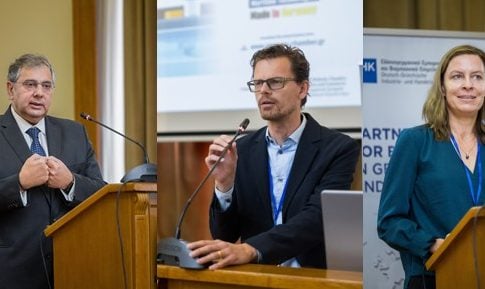Greece needs to invest heavily in human capital in order to bridge its productivity gap with other European nations, Martin Bijsterbosch (Mission Chief for Greece, European Central Bank) said in an interview with Naftemporiki and Michalis Psilos.
“Broad-based reforms that strengthen the quality of institutions are crucial,” he underlined, adding that the key is investment and innovation-friendly regulation that help to channel savings towards productive investment. “It is important that capital ends up where it is most productive and thus contributes most to sustainable income and wage growth,” he noted.
The full interview follows:
During your speech about the course of the Greek economy at the 3rd Naftemporiki Economic Conference, you emphasized that “currently the psychology in Greece” has changed due to the reforms “that were implemented.” What were the most pivotal reforms?
Broad-based reforms that strengthen the quality of institutions are crucial. This year’s Nobel Prize laureates in economics have shown that institutions are crucial for a country’s economic performance. Looking back at the Greek experience, I see three key areas of pivotal reforms. First, those that safeguarded the stability of the banking sector, especially by allowing banks to offload non-performing loans. Second, reforms that strengthened the sustainability of public finances, which helped to restore market confidence and improved financing conditions for Greece. And third, structural policies in labour and product markets that helped to enhance growth, competitiveness, and investment. Greece has already gone a long way in simplifying regulation and digitalising processes, but there is still quite some scope for further improvement, for example in property transactions and in judicial procedures.
You mention that the focus must be on increasing productivity. But Greece has many small firms with limited capacity to adopt new technologies and innovation. What is the solution?
I see three mutually reinforcing factors as critical. First, for Greece to bridge its productivity gap with other European nations, it is crucial to invest heavily in human capital. A well-educated and skilled workforce, including digital skills, is more innovative and adaptable to the ever-changing demands of the global economy. Second, simplifying or removing costly regulations and reducing bureaucratic hurdles will help to create a more business-friendly landscape, encouraging entrepreneurship and good jobs. Third, access to finance and capital markets is crucial especially for smaller firms in their scaling-up phase. Enhancing the role of capital markets, which complement the banking system, can empower these businesses to invest in new technologies, expand their operations, and hire more skilled workers.
This productivity gap is closely linked to weak investment. What Greece should do and in which areas it should invest?
The key is investment and innovation-friendly regulation that help to channel savings towards productive investment. It is important that capital ends up there where it is most productive and thus contributes most to sustainable income and wage growth. The banking system plays a key role in the allocation of capital, and maybe in the future alongside deeper capital markets. An efficient and sound implementation of the NGEU is also crucial. In addition, reducing entry barriers in markets for goods and services, and costly administrative procedures, will make it easier for new companies to compete there, which will trigger new investment. Higher investment requires a steadfast commitment to improving productivity through education, innovation and strong economic institutions.
Ι saw that you watched all the speeches at the Naftemporiki conference with great attention. What did you get from the suggestions and opinions heard from the entrepreneurs and economists?
I saw that policymakers are working hard to further strengthen the growth foundations of the Greek economy, turning it into a place where businesses can thrive (ευδοκιμήσουν), and good jobs can be created. At the same time, I heard that there are still several aspects of the business environment that could be further improved.
A very critical issue is the availability of labor with the right skills. But Greece also has to solve a severe demographic problem and the brain drain. How can these challenges be addressed?
That is a major challenge, not only in Greece but in Europe in general. It underlines the need to make good use of the labour supply that is available but still unused, for example by further reducing obstacles to labour participation of women, where employment rates remain relatively low. The still high unemployment rate among young people can be lowered by reducing mismatches between their skills and what firms need. It is also important to attract and maintain people from abroad to cover labour and skill shortages.















